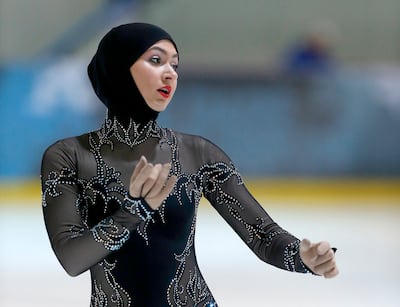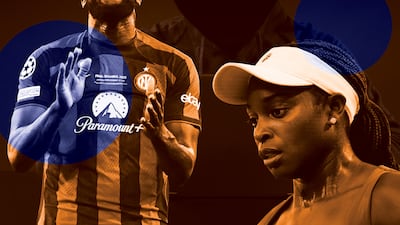It seemed almost inevitable.
Minutes after the final whistle went off in Istanbul to signal Manchester City’s Champions League triumph, Romelu Lukaku was getting lambasted on social media. And it quickly turned into racist abuse.
The Inter Milan striker had a poor game, missing a sitter in front of goal and also standing in the way of a near-certain goal from Federico Dimarco.
A quick scroll through social media showed how quickly criticism turns into racist vitriol, especially in the world of sports.
It’s no secret that the world of professional sports is dealing with a significant rise in serious online abuse.
Last week, American tennis star Sloane Stephens said the kind of comments tennis players receive on Twitter and Instagram was getting "worse."
“Social media has made athletes and public figures more accessible than ever,” said Kiera Doherty, director of Dubai marketing agency Bright Company.
“While it's great for fans to be able to connect with their heroes, this access can leave celebrities wide open to online bullying.”

Blatant abuse
PGA Tour player Dylan Frittelli has made a name for himself for his witty replies to trolls on Twitter and Instagram. He knows exactly how far people can go.
"Some stuff is just blatant," Frittelli told The National. "For me, it's just a reminder that people are idiots and that they will post whatever they want to."
The South African, 33, said he tries not to take "too much heat" from what people say online.
"I try and make a joke out of it,” he said. “I'll make a person seem stupid if they've said something stupid but if it's crossing a line, then report the post.”
Trailblazing Emirati figure skater Zahra Lari said she had learnt to ignore negative comments directed to her on social media.
“I delete them straight away and if it’s really bad, I just block that person,” said Lari. “It doesn’t bother me too much.”
Positives
While there is an ugly side to the online world, having a strong social media presence is a key requirement for today’s sports professionals.
Lari said social media gave her the platform to interact with fans and inspire the next generation of athletes.
“It really motivates me when someone sends me a video on Facebook of their daughter skating, saying they started because of me,” said Lari.
Sports stars can also earn massive amounts of revenue through sponsorship deals on online platforms.
“The number of online followers a player has is very important not only for their sports profile, but also from a business perspective,” said Pedro Correia, a UAE-based football analyst and management consultant.

Ex-European Tour professional Zane Scotland said athletes today are expected to do more than just perform on the field of play.
“They need to engage with fans because the reality is that they’re now in the entertainment business – they have to give back,” said Scotland, who is now a golf pundit.
“Ten years ago you had the option of shying away from social media, but now you almost can’t afford not to have it.”
However, there is a dark reality that comes with blue ticks and a large army of followers. Online abuse from keyboard warriors hiding behind screens does get under the skin of many.
“The intense ‘us versus them’ energy in sport has always been a perfect storm for hate-speech, cyberbullying, and comments,” said Kiera Doherty of Bright Company.
“Sadly what’s directed at athletes often goes far beyond the boundaries of free speech or opinion.”
Families in the crossfire
According to UAE football pundit Pedro Correia, it’s usually the families of high-profile athletes that suffer the most when it comes to online abuse.
“They just aren’t prepared for that kind of spotlight,” he said.
“Ronaldo and Messi for example are used to the scrutiny, but the people around them aren’t and they often don’t want to be that exposed.”
Correia says it’s especially tough for children growing up when they read abusive comments about their parents on Instagram and TikTok.
“This is probably the worst part of it and needs to be addressed on a multitude of levels.”
Female athletes targeted
A study by World Athletics found that female athletes were the main target of online abuse during last year’s World Athletics Championships in Oregon.
“The online abuse of women in sport is rampant,” said Dawn Barnable, an ultra-cyclist and co-founder of The Mettleset, a medium that represents sportswomen in the region.
“Our platform has been sent messages before that we would absolutely call abusive.”
Barnable says that while comments targeted at male athletes usually revolve around their performance, women are at the receiving end of much more.
“The abuse of female athletes appears to be much more personal, related to anything from physical looks and values, through to what can be deemed sexual harassment.”
According to Dr Martin Kramar, a Dubai-based sports psychologist, the level of negative remarks that athletes receive in the UAE is less than in Europe or North America.
“The UAE’s laws have a zero-tolerance towards online abuse which is great as it provides a level of protection to athletes and results in less abusive comments,” he said.
Dealing with abuse
Experts say there are a number of ways athletes can handle being trolled online.
One is to abandon social media altogether, a route preferred by England cricketer Zak Crawley who says it helps him block out the external noise.
However, he is very much in the minority.
“Athletes need to be trained to withstand the pressure of being in the spotlight,” says Dr Kramar, who also lectures at the Canadian University Dubai.
“They need to get to a mental state where they can even learn from the criticism and comments they receive on social media, no matter how nasty they are.”
UK-based sports psychologist David Charlton said he recommends his clients to draw boundaries and have a ‘checklist’ that governs their social media use.
“They need to decide on things like how much they’re going to use it and when they’re going to use it,” he says.
“Opening up your Instagram right after a match isn’t ideal because that’s when emotions – both of the fans and the players - are running high.”
In addition to turning off their notifications, Charlton tells the athletes he works with to check their accounts the day after a match.
UAE figure skater Lari said getting trolled online is part and parcel of being in the spotlight, and it’s something athletes have to deal with.
“No matter what you do - whether it’s good or bad - there is always going to be someone behind a screen writing nasty things.”

